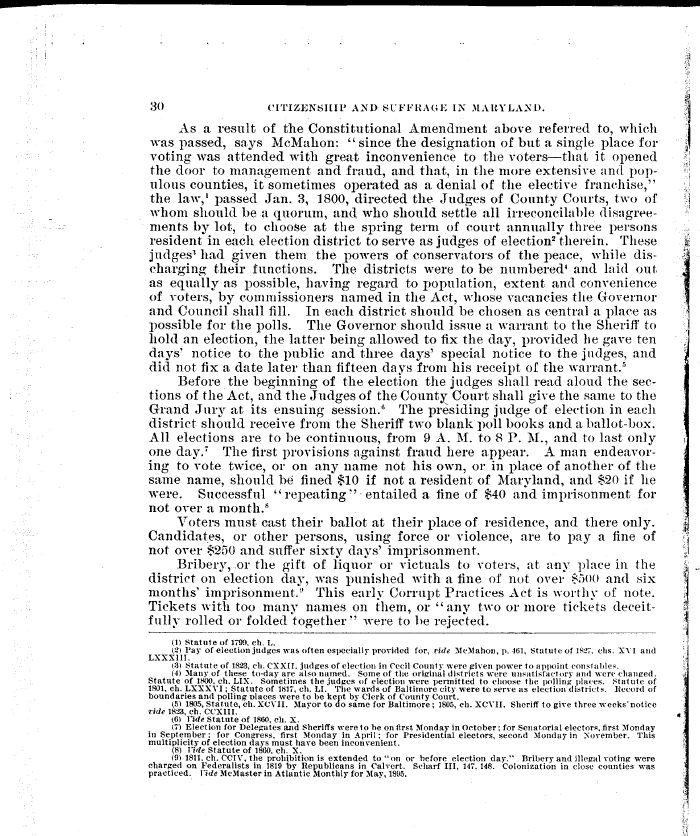|
30 CITIZENSHIP AND SUFFRA(AE, IN' MARYLAND.
As a result of the Constitutional Amendment above referred to, which
was passed; says McMahon: " since the designation of but a single place for `
voting was attended with great inconvenience to the voters-that it opened
hi
the door to manaement and fraud, and that, in the more extensive and pop-
In
•-
ulous counties, it sometimes operated as a denial of the elective
franchise,"
the law-,' passed Jan. 3, 1800, directed the Judges of County Courts, two of
whom should be a quorum, and who should settle all irreconcilable disagree-
ments by lot, to choose at the spring term of court annually three persons
resident. in each election district to serve as ;judges of election z
therein. These
jndges3 lead given them the powers of conservators of the peace, while dis-
charging their functions. The districts were to be numbered' and laid out
as equally as possible, having regard to population, extent and convenience
of voters, by commissioners named in the Act, whose. vacancies the Governor
and Council shall fill. In each district should be chosen as central a
place as
possible for the polls. The Governor should issue a warrant to the Sheriff
to
hold an election, the latter being allowed to fix the day, provided he gave
ten
days' notice to the public and three days' special notice to the judges, and
did not fix a. date later than fifteen days from his receipt of the
warrant.'
Before the beginning of the election the judges shall read aloud the sec-
tions of the Act, and the Judges of the County Court shall give the same to
the
Grand Jury at its ensuing session.' The presiding judge of election in each
district should receive from the Sheriff two blank poll books and a
ballot-box.
All elections are to be continuous, from 9 A. M. to 8 P. M., and to last
only
one day.' The first provisions against fraud here appear. A man endeavor-
ing to vote twice, or on any name not his own, or in place of another of the
same name, should be fined $10 if not a resident of Maryland, and s20 if he
were. Successful " repeating " entailed a fine of X4(1 and imprisonment for
not over a month.'
Voters must cast their ballot at their place of residence, and there only.
Candidates, or other persons, using force or violence, are to pay a fine of
not over 6250 and suffer sixty days' imprisonment.
Bribery, -or the gift of liquor or victuals to voters, at any place in the
district on election day, was punished with a fine of nut over, ~:ioo and
six
months' imprisonment..' This early Corrupt Practices Act is worth\- of note.
Tickets with too many na.lnes on them, or " any two or more tickets deceit-
fully rolled or folded together" were to be rejected.
(n Statute of 1799, err. L.
(,') Pay of election judges was often especially provided for, ride
\1cVahon, p. 401, Statute of 7~:~• chs. a\'I and
L1S\11I.
t:31 Statute of 1823, ell. CS7iII, judges of election in Cecil County were
given power to appoint constables.
(41 Wang of these to-day are also named. Some of the original districts
were unsatisfactory and were changed.
Statute of 1800, ch. LI\. Sometimes the judges of election were permitted
to choose tire polling places. Statute of
1807, ell. LXX\\'I ; Statute of 1877, eh. LI. The wards of Baltimore city
were to serve as election district.,,. Record of
boundaries and polling Maces were to be kept by Clerk of County Court.
(51 1805, Statute, ch. xC;vII. Mayor to do same for Baltimore; 1805, ell.
XC\'II. Sheriff to give three weeks' notice
vide 1Rr_r.3, ch. CC%III. R
(61 Vide Statute of 1860, ell. x.
(7) Election for Delegates aatd Sheriffs were to he on first :lfonday in
October; for Senatorial electors, first Monday
in September; for Congress, first \IOnday in April; for Presidential
electors, record Monday in November. This
multiplicity of election days must have been inconvenient.
(R) Tide Statute of 1860, ch. S.
(9) 1811, ch. CCI\', the prohibition is extended to" on or before election
day." Bribery and illegal voting were
charged on Federalists in 1819 by Republicans in Calvert. Scharf III, 147,
148. Colonization in close counties was
practiced. Tide McMaster in Atlantic Monthly for stay, 1895.
|

